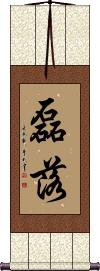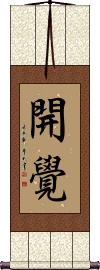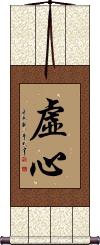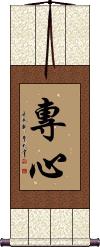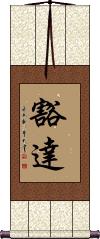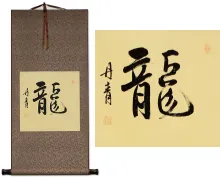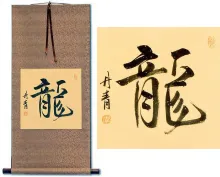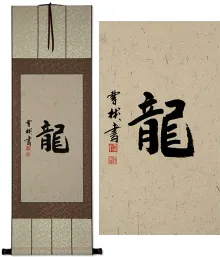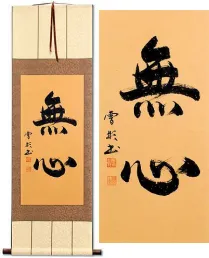Many custom options...
And formats...

Open Heart in Chinese / Japanese...
Buy an Open Heart calligraphy wall scroll here!
Personalize your custom “Open Heart” project by clicking the button next to your favorite “Open Heart” title below...
Open Hearted
Open Mind
Calm and Open Mind
Listen with Open Mind
Devotion / Dedication / Attentive / Focused
專心 makes a word that means “paying attention with your heart.”
It's often translated as “dedication,” as in “be absorbed in” or “concentrate one's efforts.” It's also used to mean “with the single mind,” “whole-heartedly,” “paying attention,” “undivided attention,” “concentration (-ed),” “engrossed,” “devotionally (listening/watching),” and/or “attentive.”
The first character means “for a particular person, occasion, or purpose,” “focused on one single thing,” “concentrated,” and sometimes, “special.”
The second character means “heart” or “mind” by itself.
My favorite translation, which comes from the Oxford Advanced Chinese/English Dictionary, is, “wholehearted devotion.”
If it seems like the meaning of this word is quite open, you are correct. The context in which the word is used matters a lot. It can mean different things depending on how you use it. This makes it kind of nice as you can decide what this means to you (within some limits). This is always positive in meaning, so even if a Chinese person reads it differently than you, it will still have a good meaning.
![]() In Japanese, they tend to use a variation of the second character which has one less stroke. If you want your calligraphy written this Japanese form, please click on the Kanji shown to the right instead of the button above. Note: Japanese and Chinese people will recognize either form.
In Japanese, they tend to use a variation of the second character which has one less stroke. If you want your calligraphy written this Japanese form, please click on the Kanji shown to the right instead of the button above. Note: Japanese and Chinese people will recognize either form.
Optimistic
Beyond optimistic, 豁達 can also be defined as sanguine; magnanimous; open-minded; openhearted; broad-minded.
豁達 is appropriate if you are, or want to be, the kind of person who is not bothered by the little things or minor troubles of life. This signifies a person who always feels things will get better. This is great for the person who figuratively sees a window of opportunity opening even as a door closes.
While a valid word in Japanese, this is kind of antiquated, and not in common use in modern Japan.
This in-stock artwork might be what you are looking for, and ships right away...
Gallery Price: $202.00
Your Price: $111.88
Gallery Price: $202.00
Your Price: $111.88
Not the results for open heart that you were looking for?
Below are some entries from our dictionary that may match your open heart search...
| Characters If shown, 2nd row is Simp. Chinese |
Pronunciation Romanization |
Simple Dictionary Definition |
開心術 see styles |
kaishinjutsu かいしんじゅつ |
{med} open-heart surgery |
磊落 see styles |
lěi luò lei3 luo4 lei lo rairaku らいらく |
More info & calligraphy: Open Hearted(noun or adjectival noun) open-hearted |
虛心 虚心 see styles |
xū xīn xu1 xin1 hsü hsin koshin |
More info & calligraphy: Calm and Open MindWith humble mind, or heart. |
豁達 豁达 see styles |
huò dá huo4 da2 huo ta katsudatsu かつだつ kattatsu かったつ |
More info & calligraphy: Optimistic(noun or adjectival noun) openhearted; frank; broad-minded |
虛己以聽 虚己以听 see styles |
xū jǐ yǐ tīng xu1 ji3 yi3 ting1 hsü chi i t`ing hsü chi i ting |
More info & calligraphy: Listen with Open Mind |
坦 see styles |
tǎn tan3 t`an tan wataru わたる |
flat; open-hearted; level; smooth (given name) Wataru level |
交心 see styles |
jiāo xīn jiao1 xin1 chiao hsin |
to open one's heart; to have a heart-to-heart conversation |
剖腹 see styles |
pōu fù pou1 fu4 p`ou fu pou fu |
to cut open the abdomen; to disembowel; to speak from the heart |
十心 see styles |
shí xīn shi2 xin1 shih hsin jisshin |
The ten kinds of heart or mind; there are three groups. One is from the 止觀 4, minds ignorant and dark; affected by evil companions; not following the good; doing evil in thought, word, deed; spreading evil abroad; unceasingly wicked; secret sin; open crime; utterly shameless; denying cause and effect (retribution)―all such must remain in the flow 流 of reincarnation. The second group (from the same book) is the 逆流 the mind striving against the stream of perpetual reincarnation; it shows itself in devout faith, shame (for sin), fear (of wrong-doing), repentance and confession, reform, bodhi (i.e. the bodhisattva mind), doing good, maintaining the right law, thinking on all the Buddhas, meditation on the void (or, the unreality of sin). The third is the 眞言 group from the 大日經疏 3; the "seed" heart (i.e. the original good desire), the sprout (under Buddhist religious influence), the bud, leaf, flower, fruit, its serviceableness; the child-heart, the discriminating heart, the heart of settled judgment (or resolve). |
弘懿 see styles |
hóng yì hong2 yi4 hung i kōi |
open-minded and warm-hearted |
明朗 see styles |
míng lǎng ming2 lang3 ming lang meirou / mero めいろう |
bright; clear; obvious; forthright; open-minded; bright and cheerful (adjectival noun) (1) cheerful; bright; (adjectival noun) (2) clear; clean; honest; fair; (male given name) Meirou show one's brightness |
淵沖 渊冲 see styles |
yuān chōng yuan1 chong1 yüan ch`ung yüan chung |
erudite but open-minded |
虚心 see styles |
kyoshin きょしん |
More info & calligraphy: Calm and Open Mind |
豪邁 豪迈 see styles |
háo mài hao2 mai4 hao mai goumai / gomai ごうまい |
bold; open-minded; heroic (noun or adjectival noun) intrepidity; indomitableness |
開化 开化 see styles |
kāi huà kai1 hua4 k`ai hua kai hua kaika かいか |
to become civilized; to be open-minded; (of ice) to thaw (n,vs,vi) civilization; civilisation; enlightenment; (surname) Kaika To transform the character by instruction; to teach. |
開放 开放 see styles |
kāi fàng kai1 fang4 k`ai fang kai fang kaihou / kaiho かいほう |
to bloom; to open; to be open (to the public); to open up (to the outside); to be open-minded; unrestrained by convention; unconstrained in one's sexuality (noun, transitive verb) (1) opening (a door, window, etc.); leaving open; (noun, transitive verb) (2) opening up (e.g. to the public); allowing (public) access |
開明 开明 see styles |
kāi míng kai1 ming2 k`ai ming kai ming kaimei / kaime かいめい |
enlightened; open-minded; enlightenment (n,vs,vi) civilization; civilisation; enlightenment; (place-name) Kaimei opening the eye |
開通 开通 see styles |
kāi tong kai1 tong5 k`ai t`ung kai tung kaitsuu / kaitsu かいつう |
open-minded (n,vs,vi) (1) opening (of a new road, railway, etc.); going into operation (e.g. telephone communication); beginning services; (n,vs,vi) (2) reopening (e.g. of a road to traffic); resumption of services to open |
胎藏界 see styles |
tāi zàng jiè tai1 zang4 jie4 t`ai tsang chieh tai tsang chieh taizō kai |
Garbhadhātu, or Garbhakośa-(dhātu), the womb treasury, the universal source from which all things are produced; the matrix; the embryo; likened to a womb in which all of a child is conceived— its body, mind, etc. It is container and content; it covers and nourishes; and is the source of all supply. It represents the 理性 fundamental nature, both material elements and pure bodhi, or wisdom in essence or purity; 理 being the garbhadhātu as fundamental wisdom, and 智 acquired wisdom or knowledge, the vajradhātu. It also represents the human heart in its innocence or pristine purity, which is considered as the source of all Buddha-pity and moral knowledge. And it indicates that from the central being in the maṇḍala, viz. the Sun as symbol of Vairocana, there issue all the other manifestations of wisdom and power, Buddhas, bodhisattvas, demons, etc. It is 本覺 original intellect, or the static intellectuality, in contrast with 始覺 intellection, the initial or dynamic intellectuality represented in the vajradhātu; hence it is the 因 cause and vajradhātu the 果 effect; though as both are a unity, the reverse may be the rule, the effect being also the cause; it is also likened to 利他 enriching others, as vajradhātu is to 自利 enriching self. Kōbō Daishi, founder of the Yoga or Shingon 眞言 School in Japan, adopted the representation of the ideas in maṇḍalas, or diagrams, as the best way of revealing the mystic doctrine to the ignorant. The garbhadhātu is the womb or treasury of all things, the universe; the 理 fundamental principle, the source; its symbols are a triangle on its base, and an open lotus as representing the sun and Vairocana. In Japan this maṇḍala is placed on the east, typifying the rising sun as source, or 理. The vajradhātu is placed west and represents 智 wisdom or knowledge as derived from 理 the underlying principle, but the two are essential one to the other, neither existing apart. The material and spiritual; wisdom-source and intelligence; essence and substance; and similar complementary ideas are thus portrayed; the garbhadhātu may be generally considered as the static and the vajradhātu as the dynamic categories, which are nevertheless a unity. The garbhadhātu is divided into 三部 three sections representing samādhi or quiescence, wisdom-store, and pity-store, or thought, knowledge, pity; one is called the Buddha-section, the others the Vajra and Lotus sections respectively; the three also typify vimokṣa, prajñā, and dharmakāya, or freedom, understanding, and spirituality. There are three heads of these sections, i. e. Vairocana, Vajrapāṇi, and Avalokiteśvara; each has a mother or source, e. g. Vairocana from Buddha's-eye; and each has a 明王 or emanation of protection against evil; also a śakti or female energy; a germ-letter, etc. The diagram of five Buddhas contains also four bodhisattvas, making nine in all, and there are altogether thirteen 大院 or great courts of various types of ideas, of varying numbers, generally spoken of as 414. Cf. 金剛界; 大日; 兩部. |
オーブン see styles |
oopun オープン |
(n,vs,vi,vt) (1) opening (a new store, golf course, runway, etc.); (adjectival noun) (2) open; frank; approachable; open-hearted; (can act as adjective) (3) open (car, collar, tournament, etc.) |
さっぱり see styles |
sappari さっぱり |
(adv,adv-to,vs) (1) (onomatopoeic or mimetic word) feeling refreshed; feeling relieved; (adv,adv-to,vs) (2) neat; tidy; clean; (adv,adv-to,vs,adj-na) (3) frank; open-hearted; plain; simple; light; (adv,adv-to) (4) completely; entirely; (adverb) (5) not in the least (with neg. verb); not at all; (adjectival noun) (6) nothing at all; completely useless; hopeless; awful |
心胸開闊 心胸开阔 see styles |
xīn xiōng kāi kuò xin1 xiong1 kai1 kuo4 hsin hsiung k`ai k`uo hsin hsiung kai kuo |
broad-minded; open-minded |
打明ける see styles |
uchiakeru うちあける |
(irregular okurigana usage) (transitive verb) to be frank; to speak one's mind; to open one's heart |
打解ける see styles |
uchitokeru うちとける |
(v1,vi) to open one's heart; to throw off reserve; to be frank |
虛懷若谷 虚怀若谷 see styles |
xū huái ruò gǔ xu1 huai2 ruo4 gu3 hsü huai jo ku |
receptive as an echoing canyon (idiom); modest and open-minded |
開誠布公 开诚布公 see styles |
kāi chéng bù gōng kai1 cheng2 bu4 gong1 k`ai ch`eng pu kung kai cheng pu kung |
lit. deal sincerely and fairly (idiom); frank and open-minded; plain speaking; Let's talk frankly and openly between ourselves.; to put one's cards on the table |
うち解ける see styles |
uchitokeru うちとける |
(v1,vi) to open one's heart; to throw off reserve; to be frank |
器が大きい see styles |
utsuwagaookii / utsuwagaooki うつわがおおきい |
(exp,adj-i) (See 器の大きい) (ant: 器が小さい) tolerant; big; flexible; big-hearted; accepting; open-minded; mature |
器の大きい see styles |
utsuwanoookii / utsuwanoooki うつわのおおきい |
(exp,adj-i) (See 器が大きい) (ant: 器の小さい) tolerant; big; flexible; big-hearted; accepting; open-minded; mature |
打ち明かす see styles |
uchiakasu うちあかす |
(transitive verb) (See 打明ける) to be frank; to speak one's mind; to open one's heart |
Click here for more open heart results from our dictionary
The following table may be helpful for those studying Chinese or Japanese...
| Title | Characters | Romaji (Romanized Japanese) | Various forms of Romanized Chinese | |
| Open Hearted | 磊落 | rairaku | lěi luò / lei3 luo4 / lei luo / leiluo | lei lo / leilo |
| Open Mind | 開覺 开觉 | kaikaku / kaikaku | kāi jué / kai1 jue2 / kai jue / kaijue | k`ai chüeh / kaichüeh / kai chüeh |
| Calm and Open Mind | 虛心 虚心 | ko shin / koshin | xū xīn / xu1 xin1 / xu xin / xuxin | hsü hsin / hsühsin |
| Listen with Open Mind | 虛己以聽 虚己以听 | xū jǐ yǐ tīng xu1 ji3 yi3 ting1 xu ji yi ting xujiyiting | hsü chi i t`ing hsüchiiting hsü chi i ting |
|
| Devotion Dedication Attentive Focused | 專心 / 専心 / 耑心 专心 | sen shin / senshin | zhuān xīn zhuan1 xin1 zhuan xin zhuanxin | chuan hsin chuanhsin |
| Optimistic | 豁達 豁达 | katsudatsu | huò dá / huo4 da2 / huo da / huoda | huo ta / huota |
| In some entries above you will see that characters have different versions above and below a line. In these cases, the characters above the line are Traditional Chinese, while the ones below are Simplified Chinese. | ||||
Successful Chinese Character and Japanese Kanji calligraphy searches within the last few hours...
